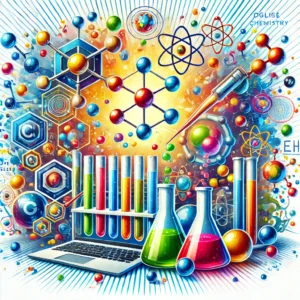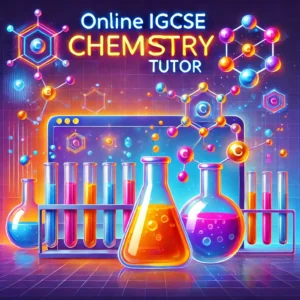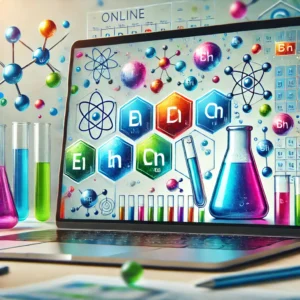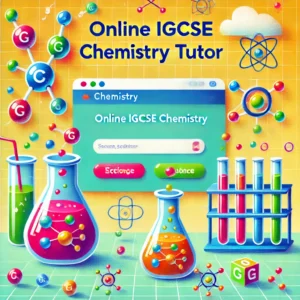Cambridge IGCSE Chemistry (0620) Tutor
At Noble Learners, our IGCSE Chemistry Tutor program is designed to help students excel in the Cambridge IGCSE Chemistry (0620) syllabus. Our comprehensive online chemistry tutoring focuses on building a solid understanding of both theoretical concepts and practical skills essential for success in the IGCSE Chemistry exams.
Why Study Chemistry?
Chemistry is a crucial subject that opens doors to many fields such as medicine, engineering, environmental science, and research. By mastering the IGCSE Chemistry syllabus, students not only excel in their exams but also gain the skills and knowledge necessary for advanced studies and professional success in science-related careers.
Why Choose Noble Learners for IGCSE Chemistry Tutoring?
Expert IGCSE Chemistry Tutors:
Our tutors are experienced professionals, skilled in breaking down complex chemistry topics like atomic structure, electrolysis, and organic chemistry. With their guidance, students not only improve their exam performance but also develop a deeper interest in the subject.Interactive Learning Experience:
Our IGCSE Chemistry Tutor program offers an engaging, interactive online platform. Through live sessions, interactive quizzes, and practical experiments, we ensure that students grasp the material in a way that’s both enjoyable and effective.Tailored Tutoring:
Every student has unique learning needs. Our tutors adapt lessons according to each student’s pace and style, whether they need help with stoichiometry, chemical reactions, or the periodic table. This personalized approach ensures a thorough understanding of every topic.

Detailed Course Overview
1. States of Matter
- Solids, Liquids, and Gases
Understanding particle separation, arrangement, and motion in different states of matter. - Changes of State
Processes such as melting, boiling, evaporating, freezing, and condensing. - Kinetic Particle Theory
Explanation of changes of state, heating, cooling curves, and the effect of temperature and pressure on gases. - Diffusion
Kinetic theory of diffusion and the effect of molecular mass on diffusion rate.
2. Atoms, Elements, and Compounds
- Atomic Structure and Periodic Table
Composition of atoms, protons, neutrons, and electrons. Understanding atomic and mass numbers. - Ions and Ionic Bonds
Formation of cations and anions, electrostatic attraction in ionic bonds, and properties of ionic compounds. - Covalent Bonds
Formation of covalent bonds and the properties of simple molecular compounds. - Metallic Bonding
Understanding the electrostatic attraction between metal ions and delocalized electrons.
3. Stoichiometry
- Formulae and Equations
Writing and interpreting chemical formulae, word equations, and balanced chemical equations. - Mole Concept
Calculations involving molar masses, Avogadro’s constant, and stoichiometric reacting masses. - Empirical and Molecular Formulae
Calculation and interpretation of empirical and molecular formulae.
4. Electrochemistry
- Electrolysis
Understanding the process of electrolysis, products at electrodes, and industrial applications such as electroplating. - Fuel Cells
Function and advantages of hydrogen-oxygen fuel cells.
5. Chemical Energetics
- Exothermic and Endothermic Reactions
Energy transfer in chemical reactions, enthalpy changes, and activation energy. - Bond Energies
Calculation of enthalpy changes using bond energies.
6. Chemical Reactions
- Rates of Reaction
Factors affecting reaction rates, including concentration, pressure, surface area, and temperature. - Collision Theory
Explanation of how particle collisions affect reaction rates. - Reversible Reactions and Equilibrium
Dynamic equilibrium, Le Chatelier’s principle, and its applications to industrial processes like the Haber process.
7. Acids, Bases, and Salts
- Properties of Acids and Bases
Reactions of acids with metals, bases, and carbonates. pH indicators and the concept of strong and weak acids. - Preparation of Salts
Techniques such as titration, precipitation, and crystallization. - Oxides
Classification of oxides as acidic, basic, and amphoteric.
8. The Periodic Table
- Periodic Trends
Explanation of periodicity, trends across periods, and within groups. - Group I: Alkali Metals
Properties and reactions of lithium, sodium, and potassium. - Group VII: Halogens
Properties, displacement reactions, and reactivity trends of halogens. - Transition Elements
Characteristics, including variable oxidation states and catalytic properties. - Noble Gases
Properties and uses of Group VIII noble gases.
9. Metals
- Reactivity Series
Order of reactivity and reactions of metals with water, acids, and oxygen. - Extraction of Metals
Industrial extraction of iron and aluminum. - Corrosion and Prevention
Rusting of iron and methods to prevent corrosion such as galvanization. - Alloys
Composition and properties of alloys such as brass and stainless steel.
10. Chemistry of the Environment
- Water and Air Pollution
Sources of pollutants and their effects on the environment, including acid rain and global warming. - Water Treatment
Purification processes for safe drinking water. - Fertilizers
Use of ammonium salts and nitrates in fertilizers and their impact on the environment.
11. Organic Chemistry
- Alkanes and Alkenes
Structures, properties, and reactions of alkanes and alkenes. - Alcohols and Carboxylic Acids
Formation and reactions of ethanol and ethanoic acid. - Polymers
Addition and condensation polymerization, and environmental concerns associated with plastics.
12. Experimental Techniques and Chemical Analysis
- Separation Techniques
Methods such as filtration, crystallization, distillation, and chromatography. - Identification of Ions and Gases
Chemical tests for identifying cations, anions, and common gases such as hydrogen, oxygen, and carbon dioxide.

Exam Preparation and Assessment
Our IGCSE Chemistry Tutor ensures students are familiar with the IGCSE Chemistry exam format, which consists of the following papers:
Paper 1: Multiple Choice (Core)
Duration: 45 minutes
Weighting: 30% of the total grade
Format: 40 multiple-choice questions based on the core syllabus.Paper 2: Multiple Choice (Extended)
Duration: 45 minutes
Weighting: 30% of the total grade
Format: 40 multiple-choice questions covering core and extended content.Paper 3: Theory (Core)
Duration: 1 hour 15 minutes
Weighting: 50% of the total grade
Format: Short-answer and structured questions on the core syllabus.Paper 4: Theory (Extended)
Duration: 1 hour 15 minutes
Weighting: 50% of the total grade
Format: Short-answer and structured questions on both core and extended content.Paper 5: Practical Test or Paper 6: Alternative to Practical
Duration: 1 hour
Weighting: 20% of the total grade
Format: Practical-based questions or written questions testing practical skills.

IGCSE Chemistry (0620) Important Questions
1. Which of the following is a property of metals?
a) High melting points
b) Poor electrical conductivity
c) Brittle
d) Non-malleable
Correct Answer: a) High melting points
2. What is the main product of the combustion of hydrocarbons?
a) Nitrogen
b) Oxygen
c) Carbon dioxide
d) Water
Correct Answer: c) Carbon dioxide
3. Which particle is negatively charged?
a) Proton
b) Neutron
c) Electron
d) Nucleus
Correct Answer: c) Electron
4. What is the definition of an isotope?
a) Same number of neutrons, different number of protons
b) Different number of electrons, same number of protons
c) Same number of protons, different number of neutrons
d) Different number of protons, same number of neutrons
Correct Answer: c) Same number of protons, different number of neutrons
5. Which substance is an alkali?
a) Sodium chloride
b) Hydrochloric acid
c) Potassium hydroxide
d) Ammonium chloride
Correct Answer: c) Potassium hydroxide
6. What type of bonding occurs in sodium chloride?
a) Covalent bonding
b) Ionic bonding
c) Metallic bonding
d) Hydrogen bonding
Correct Answer: b) Ionic bonding
7. In which process is a solid formed from a solution?
a) Filtration
b) Crystallization
c) Distillation
d) Chromatography
Correct Answer: b) Crystallization
8. What happens to the rate of reaction when temperature is increased?
a) It decreases
b) It stays the same
c) It increases
d) It becomes unpredictable
Correct Answer: c) It increases
9. What is produced when an acid reacts with a metal carbonate?
a) Salt and water only
b) Water and oxygen
c) Salt, water, and carbon dioxide
d) Carbon monoxide and water
Correct Answer: c) Salt, water, and carbon dioxide
10. Which is an example of an endothermic process?
a) Combustion
b) Freezing
c) Melting
d) Condensation
Correct Answer: c) Melting
11. What is the relative charge of a proton?
a) -1
b) 0
c) +1
d) +2
Correct Answer: c) +1
12. What is the symbol for the hydroxide ion?
a) OH⁻
b) H⁺
c) O²⁻
d) H₂O
Correct Answer: a) OH⁻
13. Which of the following is a strong acid?
a) Ethanoic acid
b) Hydrochloric acid
c) Citric acid
d) Carbonic acid
Correct Answer: b) Hydrochloric acid
14. Which gas is produced during electrolysis of water?
a) Oxygen at the anode
b) Hydrogen at the anode
c) Nitrogen at the cathode
d) Carbon dioxide at the cathode
Correct Answer: a) Oxygen at the anode
15. What is the role of a catalyst in a chemical reaction?
a) It increases the energy of the products
b) It decreases the activation energy
c) It gets consumed in the reaction
d) It increases the overall enthalpy
Correct Answer: b) It decreases the activation energy
16. Which of the following processes does not involve a chemical change?
a) Rusting of iron
b) Melting of ice
c) Burning of wood
d) Digestion of food
Correct Answer: b) Melting of ice
17. What is the main component of natural gas?
a) Ethane
b) Methane
c) Propane
d) Butane
Correct Answer: b) Methane
18. What is the pH value of a neutral solution?
a) 0
b) 7
c) 14
d) 1
Correct Answer: b) 7
19. Which of the following is an alkali metal?
a) Calcium
b) Sodium
c) Iron
d) Zinc
Correct Answer: b) Sodium
20. Which of these gases causes acid rain?
a) Oxygen
b) Nitrogen
c) Sulfur dioxide
d) Hydrogen
Correct Answer: c) Sulfur dioxide
21. In chromatography, what does the Rf value represent?
a) The distance traveled by the solvent
b) The distance traveled by the substance divided by the distance traveled by the solvent
c) The solubility of the solvent
d) The purity of the substance
Correct Answer: b) The distance traveled by the substance divided by the distance traveled by the solvent
22. What is the general formula for alkenes?
a) CnH2n
b) CnH2n+2
c) CnH2n-2
d) CnHn
Correct Answer: a) CnH2n
23. What is produced during the complete combustion of a hydrocarbon?
a) Water and oxygen
b) Water and carbon monoxide
c) Water and carbon dioxide
d) Oxygen and carbon dioxide
Correct Answer: c) Water and carbon dioxide
24. What is the molecular formula of ethene?
a) C2H4
b) C2H6
c) CH4
d) C4H10
Correct Answer: a) C2H4
25. Which element is represented by the symbol 'K'?
a) Calcium
b) Potassium
c) Krypton
d) Phosphorus
Correct Answer: b) Potassium
26. What is the name of the process in which a gas changes directly to a solid?
a) Melting
b) Sublimation
c) Condensation
d) Deposition
Correct Answer: d) Deposition
27. Which of the following is an exothermic reaction?
a) Photosynthesis
b) Combustion
c) Electrolysis of water
d) Melting of ice
Correct Answer: b) Combustion
28. What is the product when an acid reacts with a base?
a) Salt and water
b) Water and carbon dioxide
c) Salt and hydrogen
d) Salt and oxygen
Correct Answer: a) Salt and water
29. What is the chemical formula for sulfuric acid?
a) H2SO4
b) HCl
c) HNO3
d) H2O
Correct Answer: a) H2SO4
30. Which of these substances is a noble gas?
a) Oxygen
b) Nitrogen
c) Argon
d) Hydrogen
Correct Answer: c) Argon
31. Which type of bond involves the sharing of electrons?
a) Ionic bond
b) Covalent bond
c) Metallic bond
d) Hydrogen bond
Correct Answer: b) Covalent bond
32. Which gas is produced during the thermal decomposition of calcium carbonate?
a) Carbon dioxide
b) Oxygen
c) Nitrogen
d) Hydrogen
Correct Answer: a) Carbon dioxide
33. What is the electron configuration of a sodium atom?
a) 2,8
b) 2,8,1
c) 2,7
d) 2,8,8
Correct Answer: b) 2,8,1
34. Which of these is not a method of separation?
a) Filtration
b) Sublimation
c) Crystallization
d) Electrolysis
Correct Answer: d) Electrolysis
35. What happens to electrons in an oxidation reaction?
a) They are gained
b) They are lost
c) They are shared
d) They remain the same
Correct Answer: b) They are lost
36. Which of the following is a fossil fuel?
a) Coal
b) Hydrogen
c) Biomass
d) Wind
Correct Answer: a) Coal
37. Which chemical process is involved in the production of ethanol by fermentation?
a) Oxidation
b) Neutralization
c) Reduction
d) Fermentation
Correct Answer: d) Fermentation
38. What is the term for the simplest ratio of atoms in a compound?
a) Molecular formula
b) Empirical formula
c) Structural formula
d) Displayed formula
Correct Answer: b) Empirical formula
39. What is the name of the process where an acid and a base react to form water and salt?
a) Precipitation
b) Decomposition
c) Neutralization
d) Oxidation
Correct Answer: c) Neutralization
40. Which of these hydrocarbons is a saturated compound?
a) Ethene
b) Ethane
c) Butene
d) Propene
Correct Answer: b) Ethane
41. What is the purpose of a catalyst in a reaction?
a) To increase the overall energy
b) To lower the activation energy
c) To increase the enthalpy
d) To decrease the enthalpy
Correct Answer: b) To lower the activation energy
42. Which gas is produced when a metal reacts with an acid?
a) Oxygen
b) Nitrogen
c) Hydrogen
d) Carbon dioxide
Correct Answer: c) Hydrogen
43. What type of reaction occurs when a more reactive metal displaces a less reactive metal from its compound?
a) Displacement reaction
b) Neutralization reaction
c) Combustion reaction
d) Precipitation reaction
Correct Answer: a) Displacement reaction
44. Which of these substances is not a renewable source of energy?
a) Coal
b) Wind
c) Solar
d) Biomass
Correct Answer: a) Coal
45. What is the purpose of electroplating?
a) To protect metals from corrosion
b) To reduce metal conductivity
c) To reduce the hardness of metals
d) To increase metal density
Correct Answer: a) To protect metals from corrosion
46. What is the term for a reaction where heat is absorbed?
a) Exothermic
b) Endothermic
c) Neutralization
d) Combustion
Correct Answer: b) Endothermic
47. What is formed when an alkali reacts with an ammonium salt?
a) Water and nitrogen
b) Ammonia and water
c) Ammonia and hydrogen
d) Hydrogen and nitrogen
Correct Answer: b) Ammonia and water
48. What happens during the electrolysis of molten sodium chloride?
a) Sodium forms at the anode
b) Chlorine forms at the anode
c) Oxygen forms at the cathode
d) Sodium forms at the cathode
Correct Answer: d) Sodium forms at the cathode
49. What is the chemical name for rust?
a) Iron hydroxide
b) Iron sulfate
c) Iron oxide
d) Iron carbonate
Correct Answer: c) Iron oxide
50. Which type of polymerization involves the removal of small molecules, such as water?
a) Addition polymerization
b) Condensation polymerization
c) Displacement polymerization
d) Crystallization polymerization
Correct Answer: b) Condensation polymerization

FAQs
What makes an IGCSE Chemistry tutor from Noble Learners effective?
Our IGCSE Chemistry Tutors are highly qualified professionals with a deep understanding of the Cambridge IGCSE syllabus. They simplify complex topics like organic chemistry, electrolysis, and atomic structure, making them easy to understand. Each tutor provides personalized attention and customizes lessons based on individual learning needs.
How does one-on-one tutoring benefit IGCSE Chemistry students?
One-on-one tutoring ensures that students receive undivided attention, allowing tutors to focus on their specific challenges, whether in balancing chemical equations, understanding reaction rates, or mastering organic chemistry. This personalized approach helps improve problem-solving skills and boosts overall exam performance.
What technology do I need for online IGCSE Chemistry tutoring sessions?
All you need is a stable internet connection, a computer, or a tablet with Zoom installed. For some sessions, using a digital whiteboard or pentab can enhance the learning experience, especially during problem-solving or drawing molecular structures, but these tools are not mandatory.
Can I schedule tutoring sessions according to my time zone?
Yes, we offer flexible scheduling options for students across different time zones. Whether you are in the US, UK, or elsewhere, our tutors can accommodate your schedule, including evenings and weekends, ensuring that your study time fits into your daily routine.
How do I book a trial session with an IGCSE Chemistry tutor?
Booking a trial session is simple. Contact us via WhatsApp, and our representative will guide you in scheduling a free demo at your convenience. This session allows you to assess the tutor’s teaching style before committing to full tutoring.
What is your rescheduling policy for missed sessions?
If you need to reschedule a session, please inform us at least 24 hours in advance. Failure to notify us within this time frame will result in the session being charged, and it will not be rescheduled. We are flexible and do our best to accommodate changes when communicated in a timely manner.
How do you select the right IGCSE Chemistry tutor for me?
We match students with tutors based on their individual learning goals, preferences, and academic needs. With a diverse team of over 50 qualified tutors, we ensure you are paired with someone who specializes in the IGCSE Chemistry syllabus and fits your learning style.
What happens if I am not satisfied with my tutor after the demo session?
If you’re not satisfied with your tutor after the demo, you can request a second demo with a different tutor. We offer up to two free demo sessions to ensure that you find the best match. Additional demo sessions beyond the free ones will incur a fee.
Is the curriculum aligned with the Cambridge IGCSE Chemistry standards?
Yes, our tutors are well-versed in the Cambridge IGCSE Chemistry syllabus. They tailor their lessons to meet the syllabus requirements, focusing on topics like atomic structure, acids and bases, organic chemistry, and the periodic table, ensuring students receive relevant and up-to-date instruction.
How is the payment process handled?
Payments must be made in advance to the official bank account of Noble Learners. For example, if you plan to continue classes in a given month, the payment should be made before the start of that month to confirm your sessions.
